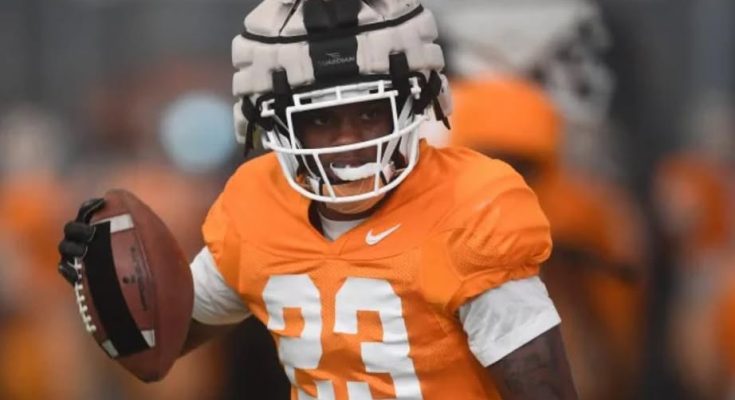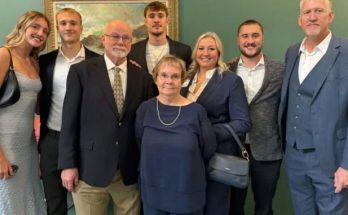Josh Heupel has put to rest speculation about the status of sophomore defensive back Boo Carter with the Tennessee Volunteers, confirming at a media day event that Carter remains a member of the team despite a rocky offseason and unresolved absences. Heupel, speaking as Tennessee’s fall camp officially began, emphasized that Carter is still part of the Volunteers’ program, but that there are firm expectations he must meet before returning to competition. He acknowledged that while there is no precise timeline for Carter’s return to the field, several unspecified requirements must be fulfilled before he re‑joins the defensive rotation Wikipedia+13Reuters+13AtoZ Sports+13.
Carter’s absence from multiple team activities prompted concerns across the Knoxville community and among Tennessee’s fan base. Reports indicated that team leaders had confronted Carter over his absence, leading to conjecture about possible disciplinary action or potential transfer portal entry. Despite the uncertainty, Heupel firmly stated at media day that Carter “is part of our team here” and that the Vols leadership council has been deeply involved in discussions regarding Carter’s status Rocky Top Insider+2Reuters+2On3+2. He noted his confidence in the structure provided by the leadership council, which he credited with having meaningful conversations with Carter, demonstrating care and concern for both his development as a person and as a teammate On3247Sports.
Heupel described the oversight of this situation as unusual but necessary. While he clarified that leadership involvement is not standard in all disciplinary decisions, in this case it provided a valuable framework for the team to navigate the situation collaboratively, with accountability extending beyond just coaching staff intervention Rocky Top Insider+6On3+6247Sports+6. That collaboration included multiple parties, each bringing different perspectives, and ultimately led to Heupel’s decision that Carter remains with the program under conditions. The coach praised the leadership council for their empathy, yet insistence that Carter adhere to team standards moving forward YouTube+4On3+4Reuters+4.
From a production standpoint, Carter enters his sophomore season coming off a strong freshman year in 2024. He appeared in 13 games, recording 38 tackles, including multiple tackles for loss, one sack and one interception. He also made an impact on special teams with an average of 16.5 yards per punt return on 12 returns, tallying 198 return yards total. His on-field performance earned him Freshman All‑SEC honors. He had even flirted with entering the transfer portal following the season, reportedly exploring the possibility of playing on both sides of the ball and negotiating for a significant NIL deal, but ultimately remained at Tennessee, likely after securing a new arrangement On3+2Rocky Top Insider+2Reuters+2.
Heupel has been candid that some media reports around Carter’s offseason were accurate, while others overstated or mischaracterized elements of the matter. He did not specify which reports were false but made clear that he was in intermittent communication with Carter during the period of his absence. Still, Heupel stood by his decision that Carter would remain with the team as long as he commits to meeting program expectations moving forward Rocky Top Insider.
Heupel gave no specific detail about what Carter must “accomplish” before being cleared for game action. However, based on common institutional practices and the coach’s remarks, these likely involve returning to full participation in team activities, demonstrating accountability and alignment with team values, and satisfying internal processes prescribed by the leadership council and coaching staff. Though no projected timeline was offered, it appears Carter will need to re‑establish trust internally before taking the field for preseason or regular‑season games ReutersRocky Top Insider.
From the broader view, Tennessee’s secondary is regarded as one of the most talented units in the SEC. Despite the uncertainty with Carter and the injury issue surrounding junior corner Jermod McCoy, Tennessee returned several key contributors—including Rickey Gibson III, safety Andre Turrentine, and nickel back Jourdan Thomas, who earned All‑SEC honors as a freshman. The Vols ranked fourth in the league in pass defense efficiency last season and remain projected among the top five SEC secondaries for 2025, thanks in part to Carter’s return if he can reintegrate fully Statesman.
Heupel’s approach reflects a broader philosophy centered on leadership, accountability, and team culture. He underscored that nobody is bigger than the program, and that while mistakes may be forgiven, team standards are not negotiable. Carter’s case, Heupel suggested, represents an opportunity for growth—both personally and collectively—within a program that values internal structures like the leadership council as tools for accountability and support On3247Sports.
The timing of Heupel’s public affirmation comes as Tennessee officially begins preseason practice ahead of its August 30 opener against Syracuse in Atlanta. With fall camp underway, the coaching staff will be monitoring Carter’s progress closely. Should he complete the required steps and regain the trust of his teammates and staff, he is still expected to assume his role at STAR, Tennessee’s hybrid corner/safety position. If not, backup options such as Jalen McMurray and Jourdan Thomas would assume greater responsibility in the rotation Rocky Top Insider+1Reuters+1.
There is added intrigue given Carter’s versatility and explosive athletic profile. He not only contributed defensively but also showcased playmaking ability as a punt returner and has been discussed in some circles as a candidate to contribute offensively. Tennessee faces depth issues at wide receiver, and Carter’s athleticism could make him a candidate for two‑way use, assuming he aligns fully with program expectations. That said, such discussions remain speculative unless Carter clears the internal benchmarks set by Heupel and the leadership group 247SportsRocky Top Insider.
Heupel remained hopeful about Carter’s trajectory, balancing firmness with optimism. He said that the leadership council and the coaching staff “care and love Boo” and want him to be at his best—personally and athletically—but that this is contingent upon Carter adhering to team norms moving forward. In short, Carter may have an opportunity to reclaim his starting role, but only if he satisfies the conditions laid out and demonstrates consistent commitment to the program’s expectations Reuters+2On3+2Rocky Top Insider+2.
From a storyline perspective, Carter’s status is noteworthy for Tennessee’s offseason narrative. Coming off a 10‑win season in 2024—the program’s second under Heupel and first since 2022—the Vols are aiming to build further momentum. If Carter returns effectively, adds depth at STAR and possibly contributes elsewhere, he could be a major factor in Tennessee’s pursuit of playoff contention. But failure to resolve the situation could lead to locker‑room friction, depth concerns, and lost potential in a position group already contending with McCoy’s uncertain timeline and injury recovery WikipediaStatesman.
Heupel’s handling of the situation also offers insight into his leadership style. He explicitly described involving the leadership council in the decision-making process—a step he says is not routine but was appropriate in this context. This collaborative model appears designed to strengthen team buy‑in and accountability, placing part of the responsibility for resolution on players who hold leadership roles, not just on coaching staff. While unconventional, it reflects Heupel’s emphasis on players owning their program’s culture and consequences On3247Sports.
Moreover, Heupel emphasized transparency without overexposing details that could undermine future resolution. He did not confirm which media reports were incorrect, but he affirmed some had been misleading. Still, his message was clear: Carter is not gone, he is not dismissed—he is still a Volunteer, but he must take steps to prove he belongs. This middle ground avoids sensationalism while maintaining clarity on program standards and internal processes Rocky Top InsiderOn3.
As Tennessee transitions toward game action, all eyes will be on fall camp developments. Carter’s progress—or lack thereof—should emerge during drills, scrimmages, and team meetings. Should he meet the implicit benchmarks set by Heupel and the leadership council, he could play a pivotal role on both defense and special teams, with speculation about offensive snaps as well. But if the work remains unfinished in his eyes and the eyes of his teammates, his opportunities may be delayed or limited.
At the end of the day Tennessee football is about movement forward, resilience, and unity. Heupel’s decision underscores these values. Carter’s return is conditional—but not off the table. If he satisfies what’s asked of him, he remains a projected starter in a secondary capable of anchoring the team’s defense. If not, Tennessee will rely on depth and leadership to absorb the loss. And whether Carter returns or not, the path forward is clearly marked: accountability, cultural alignment, and earning one’s place through effort and trust.
In the high‑stakes environment of SEC football, every decision matters. Carter’s case illustrates how Tennessee under Heupel navigates the intersection of talent, character, leadership and accountability—and how even high‑profile players must align with the standards set by the program to remain contributors on game day. Regardless of how events unfold, Heupel’s message is straightforward: Boo Carter remains a Volunteer—but only if he continues to earn that status through the work that lies ahead.



